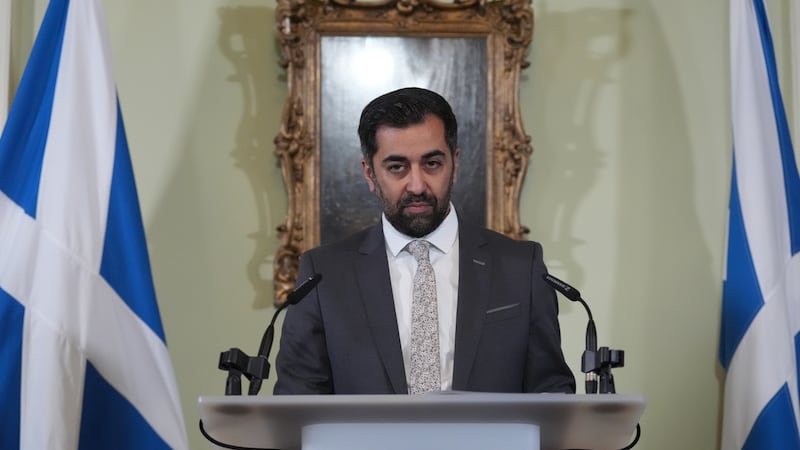Timing is everything in politics, and when Humza Yousaf became leader of the SNP last year the party was already in freefall.
Without a personal mandate, and no honeymoon period to learn on the job, he bounced from crisis to crisis.
Yousaf’s inept collapse of his party’s coalition deal with the Greens left him facing multiple confidence motions in the Scottish Parliament this week. Two votes short of a majority, he decided to jump rather than be pushed.

He has gone with honour by recognising he personally could not rebuild the trust needed to sustain a minority government, but that will not be enough to repair the damage to the SNP. Whoever succeeds him will inherit a party riven with dissent.
And as much as they may wish it otherwise, the prospect of Scottish independence has gone for a generation at least, and maybe longer. Without question, that is a bigger issue than an individual’s political career, not least because of the lessons that can be learned for the cause of reunification in Ireland.
Put bluntly, Scottish independence has become too closely associated with one party, and its fortunes have therefore been tarnished by too close an association with the SNP.

The SNP has been in power for 17 years, and it has run out of steam. Surrounded by the whiff of corruption, and increasingly out of touch with the electorate, the party is no longer the all-conquering political machine it once was.
When it took Scotland to the cusp of independence in 2014, many predicted Scots would vote Yes with just one more push. How times have changed.
Hubris lies at the heart of the SNP’s misfortune, and Yousaf’s. Believing their own propaganda, they have bungled their way through the past decade – the education system is a mess, the health service is demonstrably not safe in their hands, and public services are in freefall. (Sound familiar?)
The revelations about the destruction of WhatsApp messages during the pandemic was a nail in the coffin for SNP probity. But the police investigation into Sturgeon and her husband Peter Murrell – Murrell now charged with embezzlement – has added to the fin de siècle atmosphere.

Ultimately Yousaf’s reputation for inconsistency was his undoing. His party’s tendency to over-promise and under-deliver means it eventually has to reverse decisions – abandoning the commitment to cut carbon emissions by 75 per cent by 2030 was just the latest example.
Moving forward, it’s hard to see a replacement who will be able to re-energise the SNP. It is a loose alliance embracing traditional, socially-conservative nationalists; social democrats; and supporters with a soft to hard left agenda. It’s easier to herd cats than lead the SNP.
Both Salmond and Sturgeon had the charisma to do that, though neither was without critics. Yousaf couldn’t. For a new leader, the issues that dogged him remain – dependence on other parties to stay in power, concern about gender recognition law reform, and disagreement over the road to independence. SNP insiders privately admit the party needs time in opposition to renew.

There’s a lesson here for Sinn Féin and the DUP.
Voters will put up with incompetence in delivery for only so long. Eventually, parties will be called to account for what they do in office. The SNP’s hand would have been stronger if it had got delivery right. The best way Michelle O’Neill and Emma Little-Pengelly can advance their broader (and contradictory) constitutional ambitions is to deliver on public services.
Irish unity will be doomed if it becomes too closely associated with one party. In Scotland the fortunes of independence have risen and fallen with those of the SNP
But, as I have already suggested, there is also a broader issue for the cause of Irish reunification. Big lesson here for Sinn Féin – Irish unity will be doomed if it becomes too closely associated with one party. In Scotland the fortunes of independence have risen and fallen with those of the SNP.
The reunification movement in Ireland needs a leadership which transcends party politics – not least because a new Ireland must be able to embrace all traditions on this island. Reunification must be advanced independently of the ebb and flow of party politics.
One thing is for sure. The days of looking to Scotland for inspiration on independence are over for a while. We must take the future in our own hands.



